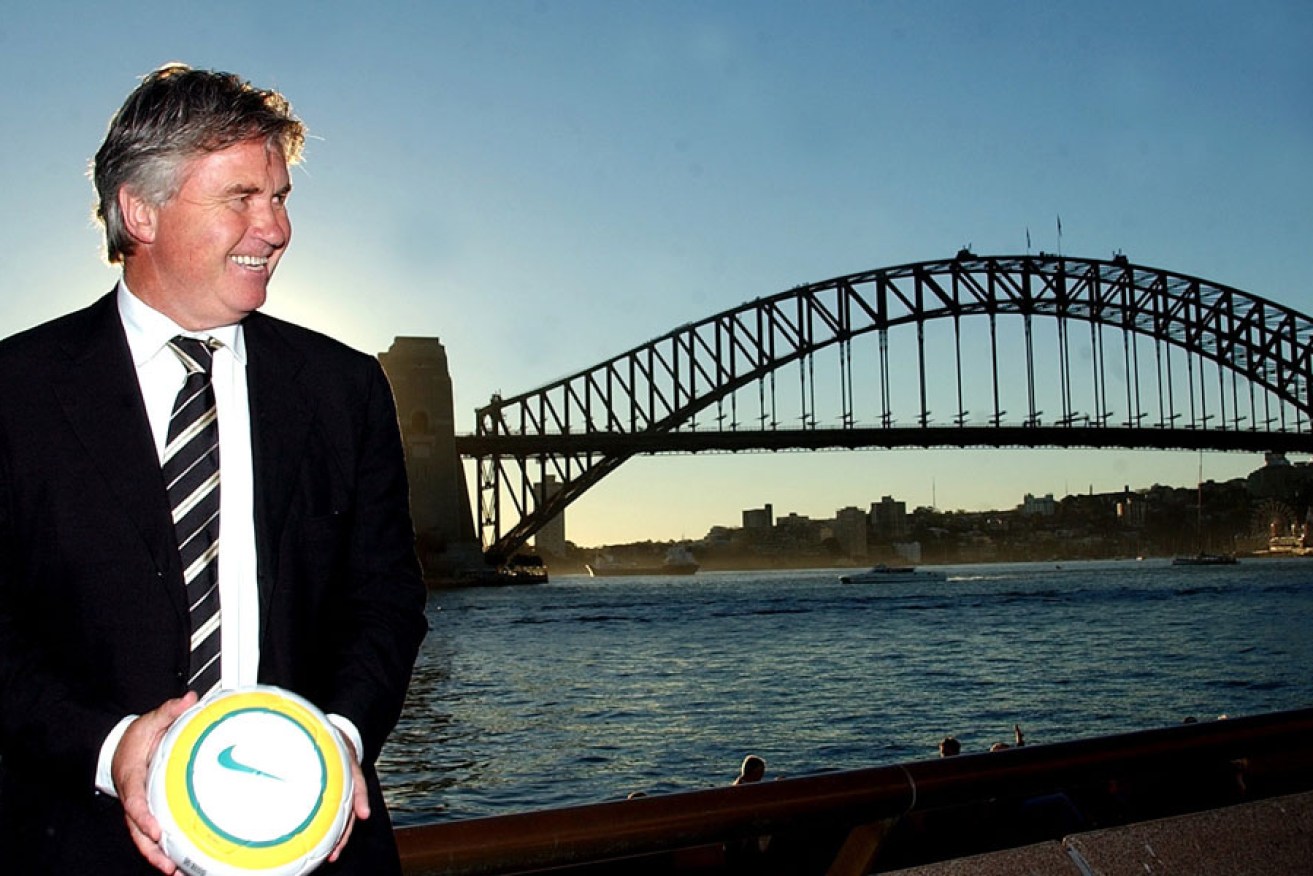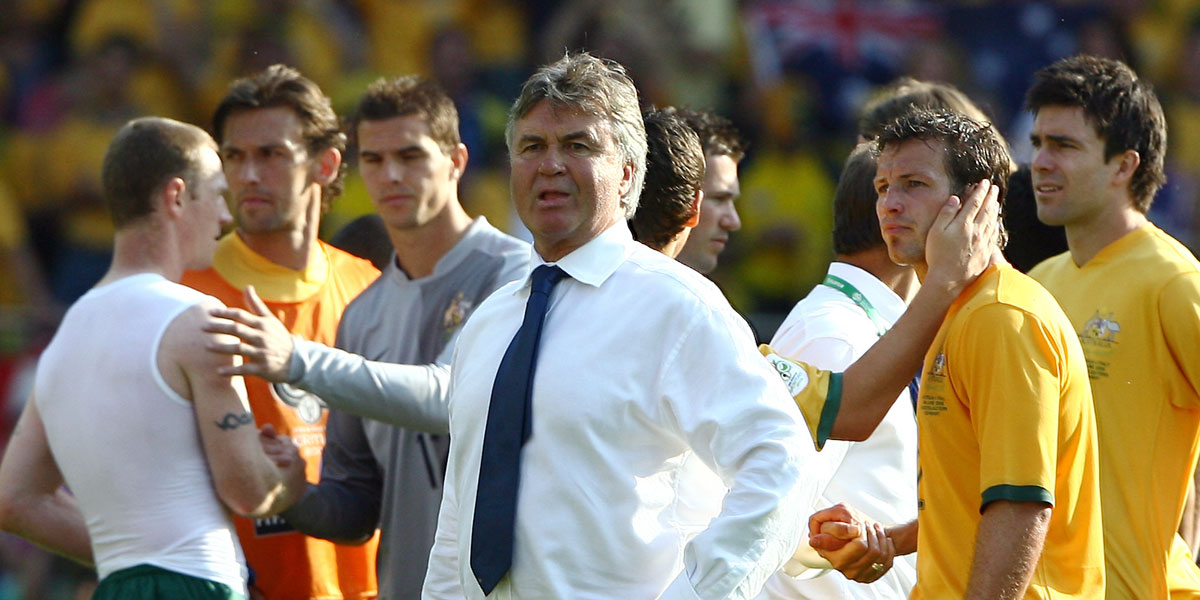A decade on, Hiddink’s legacy remains

Guus Hiddink after being appointed coach of the Socceroos in 2005.
“That is why we call him Guus Geluk.”
Those are famous words.
Well they are for me anyway. For those were the words in a text message I received after Australia scored its second goal in the extraordinary win over Japan at the 2006 World Cup.
The Socceroos’ coach at that tournament, Guus Hiddink, was nicknamed Guus Geluk (lucky Guus) in the Netherlands and it was a Dutch friend – and soccer writer – who sent me the message.
A few minutes earlier, Australia’s campaign was in jeopardy. Japan held a 1-0 lead late in the game and, with matches against Brazil and Croatia to come, an early exit beckoned for a team we had high hopes for. But Hiddink’s three attacking substitutes (which included Tim Cahill) saved the day.
Luck or tactical masterstroke?
It’s a fair question. Hiddink got away with a few mistakes in his brief time guiding Australia. At the 2002 World Cup, South Korea had a charmed run to the semi-finals under his leadership.
But there’s also no doubt that both the Socceroos, and the Koreans before them, benefitted greatly from his tactical nous and his ability to get the best out of players. At the time, Hiddink was one of the world’s most sought after coaches.
His appointment to the Socceroos’ post was announced on 22 July 2005. According to John O’Neill, then chief executive of Football Federation Australia, Hiddink signed two weeks earlier but asked for the official announcement to be delayed. So, if you don’t mind, I’ll observe the tenth anniversary now.
The importance of the appointment went beyond its immediate goal: maximising Australia’s chance of qualifying for the 2006 World Cup. It created expectations about the expertise that candidates for the Socceroos job should have.
Australia’s national coach had been Frank Farina who’d had little experience (and had barely retired as a player) before his appointment.
Given his lack of preparation for the job and the few resources he had, Farina had a reasonable record. He didn’t deserve the hostility he faced from some in the media who should have focused more on the bigger picture in the early 2000s: the soccer administration of the time was broken and couldn’t afford top coaches. Because it had no money.
Australia had experienced a high-profile international coach before Hiddink’s appointment as, in 1996, Terry Venables was given the job.
Venables had just led England to the semi-finals of the European Championship and had won trophies with Tottenham Hotspur and Barcelona.
But his tenure didn’t create the fundamental change in attitude to the national coaching position that Hiddink’s did.
There were two reasons. Firstly, he fell agonisingly short in his quest to lead Australia to qualification for the 1998 World Cup. Secondly, and perhaps more importantly, while Hiddink’s appointment was met with near universal approval, Venables’ was not.
The late Johnny Warren was among those who opposed the Venables decision. In his role as an SBS commentator, the former Socceroo fought the appointment because he felt the job should go to an Australian.
Warren also wrote that he thought the Englishman “had too many different projects going all at once”. This included Venables continuing to have a role with Portsmouth Football Club.

A dejected Guus Hiddink with Australian players after losing to Italy in the round of 16 match at the 2006 World Cup. AFP photo
We’ll never know whether Warren would have supported the Hiddink appointment but if he continued to insist that the job should go to an Australian who didn’t have other projects, he couldn’t have. Hiddink remained the manager of Dutch club PSV Eindhoven throughout his time with the Socceroos.
Despite his part-time status, Hiddink succeeded in immediately giving the Australian team better structure. He also kept the players on their toes. There were few changes to the extended squad but no one was guaranteed a spot in the starting eleven. Indeed, there were selection surprises in nearly every match the Socceroos played under him.
Without a coach of his pedigree, the qualification campaign for Germany 2006 might have been another failure.
Its success, and the excitement of the Socceroos’ ride at that World Cup, completed Australian soccer’s transformation (along with the establishment of the A-League and membership of the Asian confederation). When 2005 began, we had none of those things.
Now, 10 years after Hiddink’s appointment, we’ve been to three consecutive World Cups (after missing seven in a row) and we’re champions of Asia.
Many people deserve credit: players, coaches, administrators. But don’t underestimate how much we’ve been influenced by Hiddink’s short time with us. We now demand greater expertise in many coaching positions, not just the biggest one in the country. It doesn’t ensure that every appointment will be a good one but it has raised the bar.
A week ago, Guus ran out of geluk when, after some poor results, he left his latest job (a second stint in charge of the Dutch national team).
Nevertheless, if we hadn’t benefitted from it, the last 10 years couldn’t have been as successful.
Paul Marcuccitti is InDaily’s soccer columnist. He is a co-presenter of 5RTI’s Soccer on 531 program which can be heard from 11am on Saturdays.




